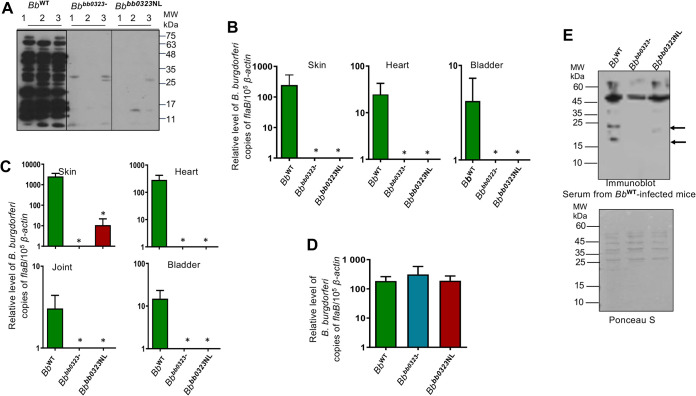FIG 4.
BbHtrA-mediated cleavage of BB0323 is essential to spirochete infectivity in murine hosts. (A) Serological response in infected mice. Mice were infected with wild-type (BbWT), bb0323 mutant (Bbbb0323-), and cleavage site mutant (Bbbb0323NL) spirochetes via syringe inoculation. Sera were collected 2 weeks after inoculation and used for immunoblotting against B. burgdorferi cell lysates. (B) Spirochete levels in the murine skin, heart, and bladder were assessed by measuring copies of B. burgdorferi flaB cDNA using qPCR and normalizing against mouse β-actin. The pathogen burden was significantly reduced in all mouse tissues infected with Bbbb0323- and Bbbb0323NL compared to those infected with BbWT (*, P < 0.05). Data represent the means ± SEM of four qPCR analyses of B. burgdorferi levels derived from two independent animal experiments. (C) Transmission of spirochetes by ticks to naive hosts. Ticks were microinjected with equal numbers of either BbWT, Bbbb0323-, and Bbbb0323NL spirochetes and allowed to engorge on naive mice. Two weeks after tick feeding, samples of the skin, heart, joint, and bladder tissues were collected from mice, and the isolated cDNA preparations were assessed for spirochete levels using qPCR. The B. burgdorferi burden was significantly reduced in all mouse tissues parasitized by ticks infected with Bbbb0323- and Bbbb0323NL isolates compared to the WT (*, P < 0.05). (D) Spirochete burdens in ticks. The ticks, which were microinjected with different groups of spirochetes as detailed for panel C, were collected after blood meal engorgement on mice and subjected to analysis of pathogen burden by measuring cDNA copies of the B. burgdorferi flaB gene using qPCR and normalizing against tick β-actin. Data represent the means ± SEM of four qPCR analyses of B. burgdorferi levels derived from two independent animal experiments. (E) The bb0323 mutants display altered immunogenic protein profiles compared to the wild type. Cell lysates from BbWT, Bbbb0323-, and Bbbb0323NL spirochetes immunoblotted with serum samples collected from mice were infected with wild-type spirochetes (as detailed for panel A). The protein bands absent from bb0323 mutants are indicated (arrows).

